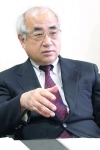|
“Less than 50 percent.” This is the shocking data that Kazuo Nishimura, the head of the Economic Research Institute at Kyoto University, one of the well-respected educational institutes in Japan, reported in his book University students who cannot calculate fraction numbers. Nishimura believes that the ILC could be one of the remedies to fix the world-wide epidemic of students moving away from science. ILC NewsLine recently had the opportunity to discuss this growing trend with the economics professor.

Kazuo Nishimura |
ILC NewsLine: What inspired you to write University students who cannot calculate fraction numbers?
Nishimura: I started thinking of this idea when I was teaching an economics class. I was explaining some principle using a differential equation. The students did not seem to understand. So, I tried to use diagrams instead, but it didn't work either. If I use the curves in diagrams, I need to explain the nonlinear functions which they did not understand. When I used the linear curve, the situation got better, but they still didn't fully get it. Then I realised that the problem is a lack of understanding in the concept of “the number per unit” -- these are “the fractions.”
I then conducted a survey in 1998 to find out how much students in their junior year of college understood about fractions. This survey consisted of 21 questions including five questions on the elementary school level. The rate of the students who got full points was less than 50 percent, even though they were the science and engineering major students at a top level national university. This number was much lower than I expected. It was really shocking.
ILC NewsLine: What do you think caused this situation?
Nishimura: I think that one of the biggest problems is the way the Japanese teaching guidelines are organised. The curriculums from elementary school to high school are not programmed in sequence, making it difficult for students to understand logically. The limited number of the subjects for the university entrance exam is another problem. They don't study mathematics because they don't need it for the exam. They don't understand math because they don't study it. This results in the fact that more young Japanese move away from studying mathematics.
ILC NewsLine: What do you think will happen if more Japanese students continue to move away from mathematics?
Nishimura: I am worried that it might lead to a decline in logical thinking ability. In the mathematical world, you reach answers through step-by-step logical thinking. This logical-thinking ability also makes people capable of solving problems by tracing a cause from a result in their daily life.
Moreover, it might lead students to lose interest in science. The most serious problem is that more and more students are avoiding physics. The rate of the students taking physics course in high schools in Japan is less than 20 percent. Therefore, this means that the population of future engineers and professors in the science and technology field will get smaller and smaller, and this really is a critical situation for the future of Japan. It is very important to maintain world-class strength in the science and technology field that has been accumulated by our predecessors.
ILC NewsLine: What is a possible solution for this situation?
Nishimura: The ILC could be one of the solutions. It is very important for Japan to participate in this international project to establish the top-level research institution with the involved excellent researchers from all over the world. I expect the ILC to build up a solid network of international wisdom and to create a wide range of spin-off effects in the science and technology field and beyond. These effects will also excite younger people's interest in science and motivate them to choose a career in science and technology. The ILC will definitely be worth the investment. We still need to work on developing a new mechanism which will enable the industry and academic circles to cooperate more efficiently to achieve this project, but the ILC will also serve as a test to develop this necessary mechanism.
Besides his busy work as a professor of Kyoto University, Professor Kazuo Nishimura is also a member of the board of directors at the Institute for Complex Adaptive Matter (ICAM). He participates in such activities as issuing Japan's first international academic journal on economic theory, establishing the International Society for Education, and promoting partnership with ICAM's scientific education programme, “The Emergent Universe Collaborative.”
-- Nobuko Kobayashi and Rika Takahashi
|


